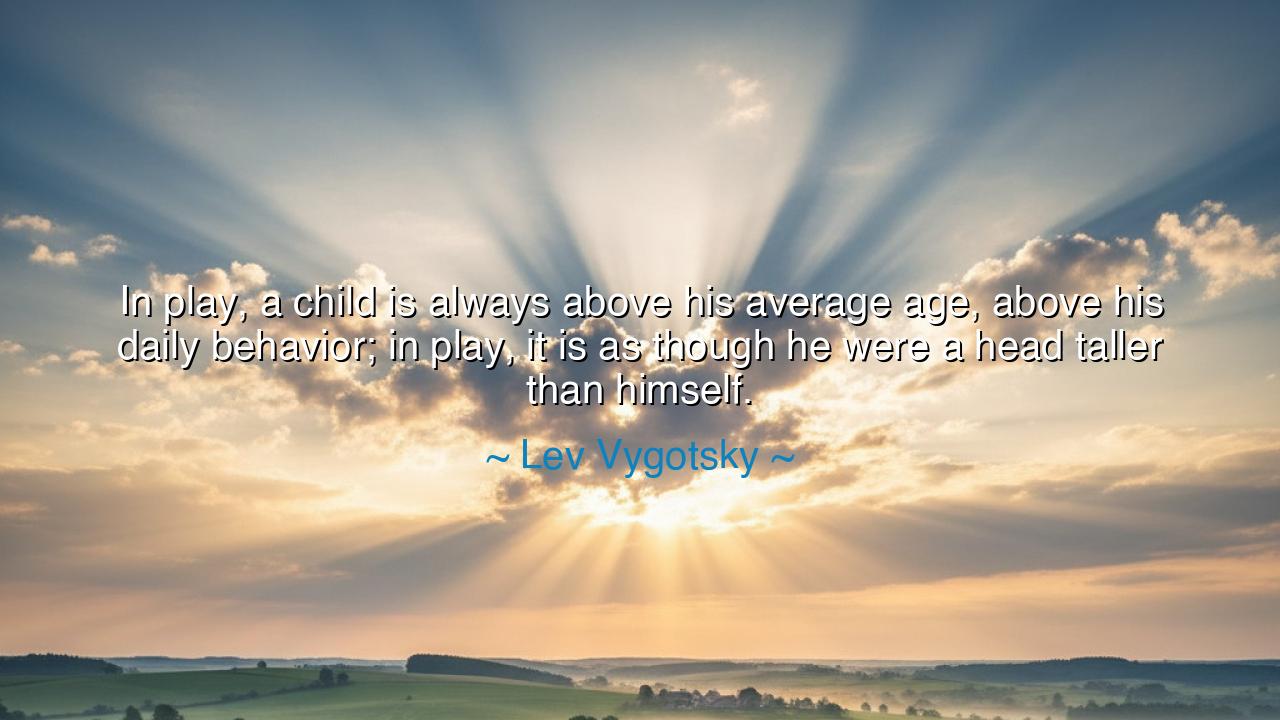
In play, a child is always above his average age, above his daily
In play, a child is always above his average age, above his daily behavior; in play, it is as though he were a head taller than himself.






In the sacred chambers of the child’s world, where the fabric of imagination is woven with threads of joy and boundless possibility, there exists a transformative power—play. Lev Vygotsky, a sage of the mind, once said, “In play, a child is always above his average age, above his daily behavior; in play, it is as though he were a head taller than himself.” These words, though spoken long ago, resonate with the eternal wisdom of the ages. For play is not merely a frivolous activity, but a sacred act—a gateway to the very essence of human potential, a means by which the child is elevated beyond the constraints of the world around them.
What then does it mean for the child to be “above his average age” in play? In this realm of imagination, the child sheds the limitations imposed by the everyday world. No longer is he bound by the restrictions of his body, his understanding, or his social status. When the child plays, he becomes a hero, a king, a leader—he steps into roles that transcend his age and experience. He becomes, if only for a fleeting moment, something greater than he is. In the act of play, the child is elevated, as though a divine hand has lifted him a head taller, allowing him to soar in a world unshackled by the rules of reality.
This idea echoes the stories of the ancient gods, who, in their wisdom, often took on the forms of children to teach lessons of power and transformation. Take, for instance, the tale of Hermes, the fleet-footed messenger of the gods. When he was but a newborn, he demonstrated wit and craft beyond his years, stealing Apollo’s cattle with the cunning of a seasoned trickster. In that moment, he was not a mere infant but a being whose mind surpassed his body’s limitations. The gods themselves recognized this as a divine play, where the limitations of the earthly realm could be transcended through the power of wit and imagination. Likewise, the child in play rises above their everyday self, becoming a giant in a world of possibilities.
Consider, too, the life of Leonardo da Vinci, whose creative genius was first nurtured in the simplicity of play. As a child, he was said to have spent hours drawing and experimenting with the world around him, imitating the great works he observed and exploring the limits of what was possible in art and invention. It was through his early play that he discovered the vastness of his own potential, playing with concepts and ideas long before he turned them into the masterpieces for which he would be celebrated. In this sense, play was not a distraction from reality, but a way for Leonardo to transcend his age and understand the world in ways that few could.
Vygotsky's insight into the child’s play invites us to consider the deeper meaning of childhood itself. The child, in his freedom, has the capacity to reach heights that adults often forget. The weight of responsibility, the constraints of routine, the boundaries of society—these often hold the adult back from the expansive mind of the child. Play, then, is not mere diversion; it is the very essence of creative power. It is in the realm of play that the child is not simply preparing for the future, but rather embodying the potential that lies hidden within the present moment. In the child’s world, there is nothing impossible.
This truth offers a profound lesson to us all. In our adult lives, we often become entangled in the web of responsibility, work, and social expectation, forgetting the power of the imagination and the freedom that comes from play. We are weighed down by the necessities of life, and the spark of creativity that once flowed freely becomes stifled. Yet, just as the child is elevated in play, so too can we, as adults, find renewal by reconnecting with the joy of exploration, of imagination, of free movement without the confines of duty. The child’s play is a reminder that growth does not always come through struggle, but through joy and expansion.
The lesson here is simple, yet profound: we must learn to embrace the spirit of the child—the spirit of play—in our daily lives. Whether through the pursuit of a passion, the exploration of new ideas, or the willingness to let go of our rigid structures, we must give ourselves permission to rise above the limits of our daily existence. Just as the child in play becomes larger than life, so too can we, through creativity and joy, find ourselves lifted to new heights. Let us therefore play, not in the sense of childishness, but in the sense of embracing the full spectrum of our human potential. Let us be reminded that, in the end, it is the playful spirit that will carry us forward, just as it carried the child toward the grand heights of possibility.






AAdministratorAdministrator
Welcome, honored guests. Please leave a comment, we will respond soon